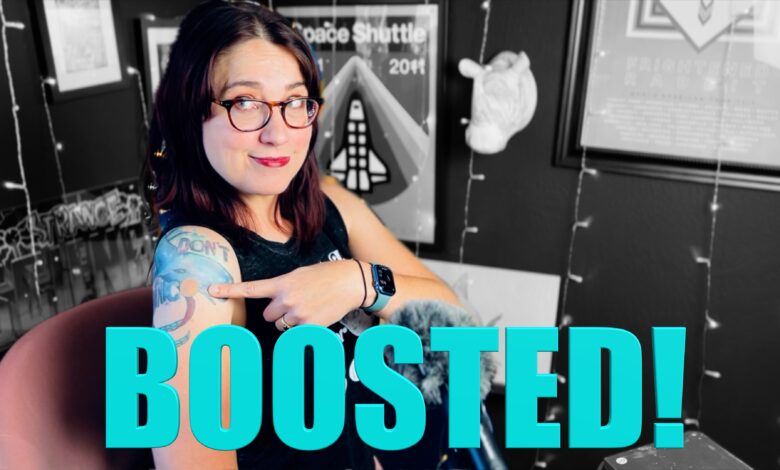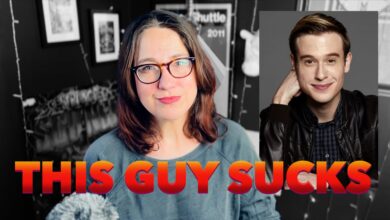Why mRNA Vaccine Researchers Won the Nobel Prize & Why We Can’t Forget Novavax

This post contains a video, which you can also view here. To support more videos like this, head to patreon.com/rebecca!
It’s a very happy week for me, friends, because on Monday I got my COVID-19 booster along with a freshly update flu shot, which means I can happily move into my favorite season without worrying much about getting sick or, even worse, getting more vulnerable people around me sick. I’m still going to mask up and generally avoid gathering indoors, but I’m going to be way less annoying about it, which will make everyone around me happier.
To make things even better, I got my mRNA booster on the very day that that booster won the Nobel Prize! Okay well the booster didn’t win, but two of the researchers involved in its creation won: Katalin Karikó and Drew Weissman.
Now I know what you’re thinking: hold on, Rebecca, I am very well-educated on this subject and watch every episode of Joe Rogan and thus I know that the man who should have won that Nobel Prize for MRNA vaccines is Dr. Robert Malone, who not only almost single-handedly invented MRNA therapies but also has been a brave voice arguing that they are secretly very dangerous, despite the obvious fact that they’ve saved millions of lives over the past three years.
If you missed my video on Malone from January of 2022, I highly recommend you pause this one and go watch that first, because it makes all this much more enjoyable. But just in case you’re tight on time, I will sum it up: Malone was an mRNA researcher who, in the 1980s, made an important discovery that you can use fat to expose mRNA to cells and get them to start producing proteins.
It was an important step, but Malone was one of hundreds of people who contributed to that scientific progress. When COVID-19 appeared, he became furious that some researchers got the spotlight while he was ignored. One of those researchers, as I mentioned in that previous video, was Katalin Karikó, who revealed to a journalist that Malone had emailed her claiming to be her “mentor” and told her “This is not going to end well.” In fact, they had only met once, when Malone invited Karikó to give a talk.
So, what I’m saying is that I hope the Nobel Assembly is throwing in a bonus security detail for Karikó, because Malone sounds completely unhinged.
All that said, I DO think that the Nobel Prize can be a tiny bit problematic, because so many of our most incredible scientific advances come about due to the collaborative effort of many, many people, as Karikó herself has pointed out. The world (somewhat) pays attention to the people chosen for Nobel Prizes, and so the committees really need to carefully consider who they put in the spotlight and who will inevitably be left standing in the wings. In the past this was a much easier decision, because there really were very clear and obvious “discoveries” by independent scientists worthy of recognition, by which I mean you could just go with the most prominent old white guy whose name is on the door to the lab and call it a day.
If the aggrieved, humorless, and historically ignorant old white men could please just choose one thread in which to leave their angry and pedantic comments below, the rest of us will surely appreciate it.
Anyway, out of hundreds of people who made important discoveries on the way to my latest booster shot, why did the Nobel committee pick Karikó and Weissman? Well, it certainly seems like a pretty damn good choice. Because yes, people like Malone made important advances on mRNA in the 1980s but by the ‘90s, the entire field ran into a huge roadblock: the human body’s immune system is just too good. There was something about the synthetic RNA that made it stick out as an obvious foreign invader, meaning that cells attacked and killed it before it made it to its destination. Not only was it not therapeutic, but the resulting immune response could be downright dangerous for some patients.
This problem was so huge that pretty much everyone gave up: universities, governments, and private industry all thought it was insurmountable. But Katalin Karikó didn’t think so, even after years of grant rejections AND being demoted in 1995 by her employer, University of Pennsylvania, after six years of work, all because she couldn’t convince anyone that she could find the answer.
She considered giving up and finding something new to do, but thankfully in the end she decided to double down. In 1997 she met Drew Weissman, who at the time was an immunologist at UPenn working on RNA therapies for brain problems. They met at a photocopier, where they shared gripes about the lack of funding in RNA.
They teamed up, and in 2005 they published the groundbreaking fix: altering one bit of the synthetic RNA allowed it to sneak past the immune system and deliver its message to the cells. At that point they knew they had a life-changing innovation on their hands, so in 2006 they formed their own biotech company, where they continued their mRNA work. Progress was slow, but in 2013 Karikó realized UPenn was never going to allow her to actually apply her mRNA research. So, she took a job at the German start-up BioNTech. In 2019 she became their senior vice president, and in 2020…well, we all know what happened in 2020. mRNA vaccines were able to be developed much more quickly than traditional vaccines, meaning that it’s safe to say that without Karikó’s insight AND her persistence, the COVID-19 vaccines may have not been ready in time to save millions of lives during this pandemic. While it’s a shame that there will be many people forgotten in this story, I’m glad that she and Weissman are getting their time in the spotlight.
HOWEVER! There is one other thing I want to mention because it’s just as important as remembering that there are other people who are being left out of the narrative: there are also other technologies that are being overshadowed. Novavax is a more traditional-type of vaccine–while mRNA vaccines teach your cells how to make the necessary proteins, Novavax dumps those “spike” proteins right into your body via nanoparticles, along with an “adjuvant” that boosts the effect. The mRNA vaccines had the benefit of the US’s largest pharmaceutical companies pushing them through clinical trials, leaving Novavax limping behind as case rates dropped.
While the mRNA vaccines are easier to produce, Novavax is cheaper, easier to store (you can just refrigerate it), and it looks like it’s nearly effective, or possibly equally effective, or possibly more effective if you mix and match, as mRNA vaccines alone at protecting against omicron. As a little bonus, it appears that people have been reporting way fewer side effects. This paper is in preprint but it suggests less sleepiness, joint pain, fever, headache, and way less injection site and muscle pain (which is my only side effect when I get boosted). And great news, just this week, the FDA has finally approved Novavax for distribution so you should be seeing it in your local pharmacies soon.
Now to be clear, I’m not suggesting that you wait to get your booster if your doctor or local pharmacy only has Pfizer or Moderna mRNA vaccines – the current data suggests they’re all about the same. And anecdotally, at every point in this pandemic I have chosen to get whatever is available first, and almost every time it’s been the “less effective” vaccine, and I haven’t gotten COVID yet. But it’s critical for the world to have access to multiple kinds of vaccines, especially when it comes to poorer countries that have greater difficulty coming up with the production, storage, and distribution facilities for something like mRNA. Plus, Novavax’s successful use of an adjuvant to boost results might translate over to future mRNA products, benefiting everyone.
The takeaway is that mRNA vaccines are incredible technology that not only saved millions of lives but may go on to save millions, or billions more as that technology is applied to other therapies. And personally I think the Nobel Prize went to some very deserving scientists. At the same time, we should celebrate the fact that we still have multiple ways to accomplish the goal of vaccinating the world and saving as many lives as possible, and we should remember that we all benefit from allowing scientists to freely explore the many ways we might solve future problems.
And please get your booster! The current boosters are specifically targeted to omicron, so getting vaccinated in the coming weeks can help make your winter way less sniffly, and of course it can help the immunocompromised people around you make it through the winter alive and well.




